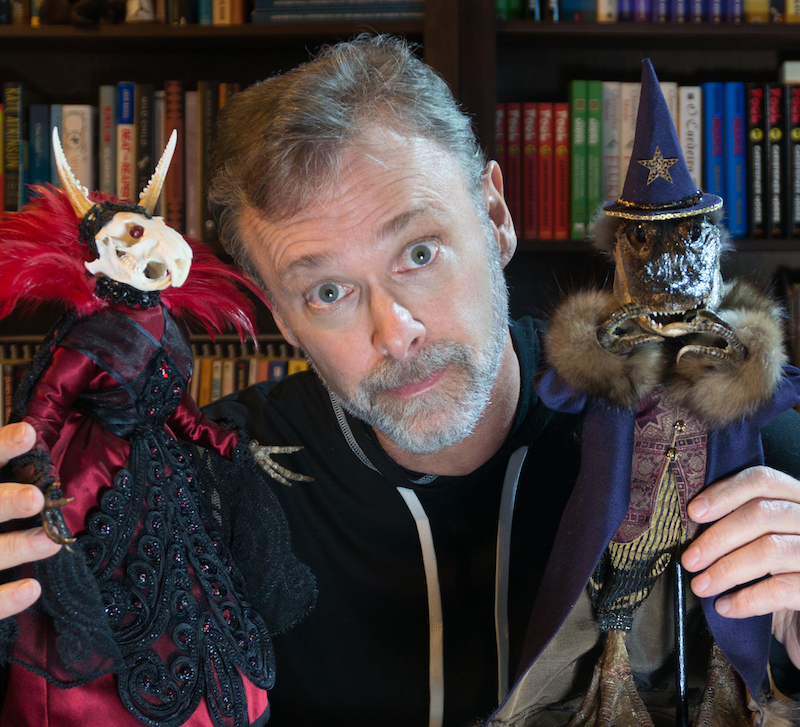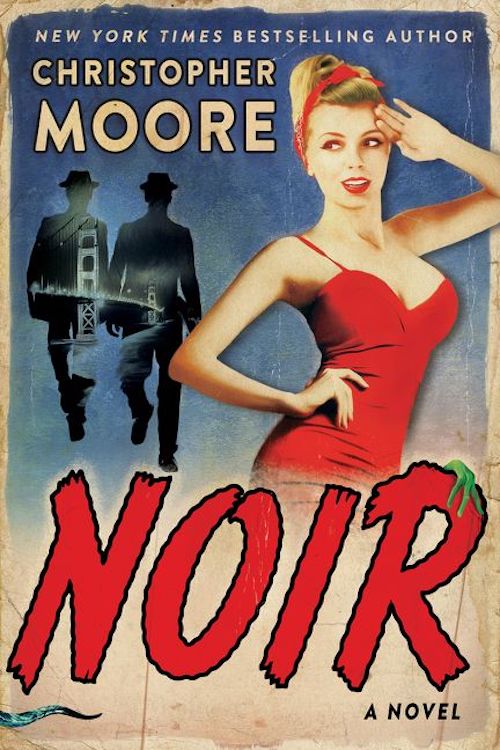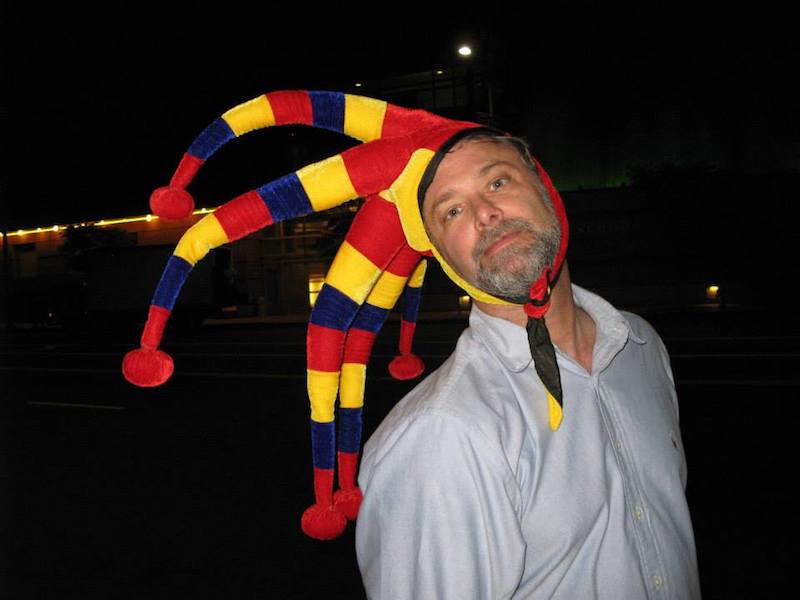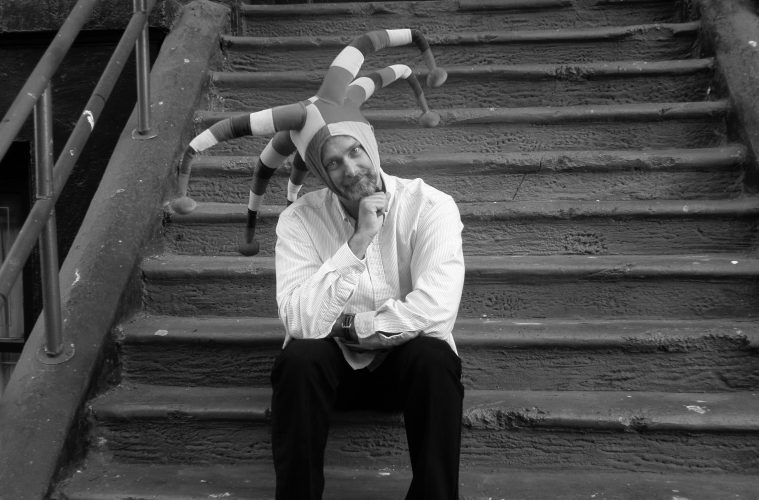Christopher Moore has been a big influence in my life. We all have a handful of authors that we keep in our hearts as they have provided escape, solace, joy, hope, direction, smiles, and tears throughout our lives. These authors always seem to be there for us when we need them. Christopher Moore has been there for me since I was 24. I was moving from Vail, CO to Dallas, TX and it was a difficult transition in my life. On my last day in Vail, a friend of mine gifted me a novel by an author she said I would love. The novel was Lamb by Christopher Moore. It instantly became an all-time favorite, it still is to this day. It helped shape thoughts on religion and life. Two things I was confused about at the time. Within months I had read every novel by the New York Times bestselling author and haven’t missed one Moore novel since, all 16 gems.
His writing is described as “comic fantasy,” which is apt. What often gets left out is the genuine heart that is at the center of all Moore’s novels. The friendships. The goodness of it all. How one can blend such humor with such seamless, ardent prose and absurdity is beyond my understanding. This is no exception with his new novel, Noir.
It takes place in 1947 San Francisco and overflows with pulpy, fantastical delight. The central characters range from dames, hustlers, lesbians, war vets, moon men, and a horrible little kid. The bond and kinship within this blend of cultures are pure at heart and Moore has made each one forever memorable, a common theme in all of his novels. After reading the book a few times, then listening to the audiobook (which I highly recommend as the performance by Johnny Heller is amazing) it really sunk in how there are no throwaway lines in Noir, or in any of his novels. Each line can be sweet, laugh out loud funny, and uniquely descriptive all at the same time. Every. Single. Sentence.
Christopher Moore was heavily influenced by John Steinbeck’s comic work. “…not so much the heavy stuff that he’s more known for. Steinbeck wrote about flawed people with great affection and forgiveness. I aspire to that in my own work,” Moore has said. That, to me, best describes Christopher Moore. He is the Steinbeck of our time set in a comic fantasy world, and he surpasses those aspirations consistently. It was a true dream to interview this kind, sincere, and creative genius. We talk about Noir, mental illness, dealing with the madness of the world we are all currently living in, aliens, life, and of course, smiles. Enjoy.

Serial Optimist: We are living in a time when it’s hard for many to find happiness. What are a few things that make you smile daily? What little things bring you happiness?
Christopher Moore: Squirrels make me smile. I have a little place in the redwood forest where I go to write and every morning squirrels come up on the deck to have a snack. (We have feeders.) When I’m in the city I have a webcam that overlooks the deck so I check in with the squirrels from there.
SO: Honestly that’s too fucking cute. You are fantastic on Twitter. How do you clear your head of the news and deal with the ugly madness we are living in? I find myself going on many more hikes than I used to. Every few days I crave nature, just to unplug.
Chris: Lately I haven’t been terrific at putting the news aside. I know I need to if I’m going to write comedy, which is what I consider my novels, but even when I look away I feel as if I’m on an airplane and the captain has come on the speaker and said, “We’ve had some engine trouble, and we’re going to have to make an emergency landing, but don’t look out the window whatever you do.” I gotta keep looking out that window, even if I’m going to see everything in flames. So, no solutions other than going to my writing hovel and sending the modem back to the city with my wife so I can’t see what’s going on in the world.
SO: Not looking out the window is nearly impossible these days. Have you ever had any issues or battles with depression or anxiety? How did you face those issues and what advice would you go back to in those moments and give yourself?
Chris: I had a really debilitating bout with depression about 30 years ago when I was still drinking. Dangerous, self-destructive depression. I eventually pulled out of it by going to AA and using the program as a therapist (because I had no insurance and no money for a shrink.) I think if I had to tell younger me anything it would be to get honest and get help. Everyone at the time told me I would eventually be okay, and I was, but I’m not sure I’d believe myself any more than I did them. The whole “one day at a time” thing was key to feeling better. When you try to stare down the barrel of the future it can be overwhelming, one day at a time and you can do it.
I will say this, by way of instruction. Sometimes, someone just saying something will pull you out of a tailspin. I remember at the absolute nadir of my despair, when I was getting ready to pack it all in, a friend just showed up and asked me if I was alright. That little bit of contact pulled me back from the edge. If you think someone might need to hear a kind, concerned word, they probably do. And if they don’t, say something anyway.
SO: Those words mean so much to many. They help me and everyone else out there in the effort to destigmatize talking about mental health. Thank you for sharing that. Your new book, Noir, is so great. Noir is a favorite genre of mine and when I heard it was the title of your new book I was one excited mug. How much fun was it getting to write in the gumshoe Noir style? Can you describe how you came up with the story? Bite bite bite.
Chris: As you guessed, writing Noir was all about the tough-guy language. So that’s really what I concentrated on. I also just sort of grabbed all the tropes of Noir – tough-talking guys, dangerous dames, fog, neon, liquor, guys with guns – and tried to give them a goofy twist. I wanted to cover the cultural changes that were going on in the 1940s, so I knew the book would be partly set in Chinatown. I looked for something that could cause a ruckus there, which turned out to be a tradition of putting the urine of deadly snakes into noodles as an aphrodisiac.
Then, when I was doing research, one web search came up with an article on a UFO conspiracy site that said the commander of Roswell Army Airbase was in San Francisco in 1947, and that was the year that “the crash” happened, so I figured, “Oh yeah, that’s going to go in the book.” The rest was just guys and dolls.

Guys. Dames. San Francisco in 1947. A deadly African snake. An Airforce general from Roswell, New Mexico. What could go wrong?
SO: You put the reader in 1947 San Francisco effortlessly, like a dream you don’t want to end. I love how many of the places and areas in the book are real. Did you go to any? Did you create somewhat of a “map” in your head for the book?
Chris: Many of the places in the book were real in 1947, but are long gone now. Of course, the streets of North Beach and Chinatown look much the same as they did in those days, and many of the landmark sites in the book, like Telegraph Hill, Coit Tower, and the Ferry Building are part of my day-to-day life, so it all felt pretty familiar. I always have a map in my head, and I use maps to figure out time in scenes. (Like me, Sammy, the protagonist, walks all over town, so I had to be able to figure out how much time it would take him to get from one place to another.)
SO: The friendships in Noir are sincere, old school, where everyone had the other’s back, and nothing needed to be said about it. What I believe the kids now would call “ride or die.” These companions are so genuinely written that it’s easy to forget the diversity of people you brought together. This crew is made up of a white guy pretending to be Italian, a black man, a Chinese man, a boss lesbian, a strong female (amongst many), and more characters of different cultures. This is very refreshing. Did any of that come to mind when creating these characters?
Chris: All of it. As I said, I wanted to show how things were changing in the city, and also, how many elements were around in those days that would seem unusual even by more modern standards, like the drag king clubs, where women dressed as men and performed as the male crooners of the day. The Chinatown clubs where Chinese performers mimicked Anglo acts like The Andrews Sisters or Frank Sinatra.
I wanted to show how the War had attracted thousands of African Americans to the Bay Area to work in the shipyards, and how that changed the face of the city, as well, all the Wendy the Welders and Rosie the Riveters, who were doing tough, industrial jobs during the war, but found themselves wondering what to do after the war, now that they’d had a taste of independence.
The “gang” of friends was more or less modeled on the group of pals in Steinbeck’s Cannery Row – which was written during that period. Steinbeck wrote about those flawed characters with a bemused sweetness and forgiveness that I’ve always admired. I wanted to create a similar feeling with my “guys.”
SO: Did you watch any Noir classics or dive into some pulpy fiction for any inspiration? What are some of your favorite Noir classics and characters?
Chris: Of course, I reread and watched “The Maltese Falcon” and “Dark Passage,” both filmed in San Francisco about the time the book is set. I reread some Hammett and Chandler and dove into Jim Thompson, James M. Cain, and David Goodis. I reread Damon Runyon, and a lot of the language is constructed around the way his guys talk. I watched a lot of old films like “Double Indemnity,” “The Big Sleep,” and “Sunset Boulevard,” but I also watched some of the modern and comic takes on the genre like “Dead Men Don’t Wear Plaid,” “Kiss Kiss Bang Bang,” and “The Nice Guys.”
I’m not obsessed with the genre, or really even terribly conversant with it like experts James Ellroy and Eddie Mueller are, but I like to see what people are doing with it in different contexts. The whole Netflix/Marvel sub-genre of Daredevil, Luke Cage, and Jessica Jones feels very “Noirish” (and cool) to me.
SO: How was the book tour for Noir? Do you in general like going on tour? Any favorite stops?
Chris: The tour was good. People came out and I didn’t get sick. That’s always a good tour. (Shaking hands and hurtling through the sky in a metal tube full of germs will usually take me down after 18 months of writing and living more or less like a bubble boy.) I got to visit some of my favorite towns like Seattle and Boston and didn’t get to others like Chicago and D.C. Most notably, I got to visit the art museum in Milwaukee for the first time, and the building alone is worth the time. It’s this massive, space-ship-looking thing with wings that move with the wind and it sits right on Lake Michigan. Really remarkable.
SO: Your way with words is genius. It’s a style that I can’t define. A mix of one-liner analogies so perfectly descriptive while also being a joke and hysterical and important to the story all at once. Do you consider yourself a comedian? A humorist? A satirist? Just a funny writer?
Chris: I guess I feel like I write comedy, but I don’t consider myself a comedian. I’m a novelist who writes funny books, and I’ve learned to work in that form. I try to have everything serve the story, which constrains me from riffing on the story of the day but also allows me to write jokes from a lot of different points of view. I don’t swerve out of my lane very often. Occasionally I’ll write a funny essay or speech, but I think I’m best in the context of a novel, so I guess I’m a “comic novelist”?
SO: That sounds spot on. You’re writing style has been described as, “comic fantasy.” Accurate?
Chris: That’s close enough. Although I usually have to qualify it because when people hear “fantasy” they often think of elves and unicorns and whatnot and that’s not really what I do.
SO: In addition to the countless laughs all of your books bring, there’s also such genuine heart at the core. Your book, Lamb, had a huge influence on my life. You somehow humanized Jesus and made him more relatable to me than anything I had read before. I understand it’s fiction, but it just helped me look at things differently in a really beautiful way. Did you know the impact that book would have on people’s lives and still does? Are you a religious person in any way?
Chris: I’m not a religious person by inclination. I’m a Buddhist, but not a very good one, I guess, but that philosophy reconciles with what feels true to me, so that’s what I call myself. As for knowing how Lamb would affect people, I didn’t even know if I could do it. I set out to tell the lost years of Christ’s life as a comedy, yet I didn’t want it to be an attack book and I didn’t want it to alienate people of faith, yet I wanted to show the humanity of the character.
The idea came to me when I was reading The Master and Margarita, by Mikhail Bulgakov. It’s sort of a magical realism novel set in 1920s Russia, but it has a scene with the trail of Jesus in it from the point of view of Pontius Pilate, who has a migraine at the time. It’s hot and it’s bright and Pilate just wants this annoying Jewish kid to go away, so he washes his hands of him. Well, those details, the headache, and the visceral detail of the scene made a story I’d read a hundred times seem very vivid and real for the first time, and I thought, “What if you did the whole story of Christ like that? What if you really put people in it?” That’s where Lamb started.
SO: Amazing. What a concept. I know in many of your books you do a ton of research. Does that help with your storytelling? To have a real point of view and knowledge to base wonderful absurdity?
Chris: The dirty secret is that a lot of the comedy comes from the research. My first reaction to new things is often a comic one, so when I go to a new place or read about something I’m unfamiliar with, I’ll have comic impressions, and those often end up going into a book. I also ask the reader to believe some pretty absurd stuff, and I think that’s easier if the setting and people in the story seem credible and real. Research helps with that. Very often it will shape the story, too, as in the case of the Roswell detail above.
SO: You come up with the best characters hands down. How? Where do these people come from? Each character lives on in the reader’s mind forever because of the way you create them. For example, how did Sammy in Noir come into existence?
Chris: My characters are often composites of people I’ve known, sort of Frankensteined together from different personality traits that I hope make them more interesting to the reader, and I always have to think of what the character needs to do. It’s more interesting, I think if they have to do something that’s hard for them, or against their nature, so I almost always create the characters counter to the story they need to live.
Sammy, in Noir, is sort of hiding from the world, keeping his head down, pretending to be Italian because it helps him fit into the neighborhood. He also has a bum foot that was run over by a forklift, which kept him from serving in WWII, where his two brothers were killed, so he feels guilty and feels like people see him as a coward for not serving. So he’s hiding out, tending bar, when this dame comes in who really rings his chimes. Suddenly he wants to share his story, he wants to be a stand-up guy, and when she gets in trouble, he has to be the hero.
Sammy is about 90% imaginary, but the foot injury that keeps him out of the war is something that happened to my father when he was a young man, except my father was working in a factory, waiting to get into the highway patrol academy, when his foot was nearly severed by a forklift crushing it against a wall. Doctors wanted to cut off his foot, but as they were sedating him, he made his mother promise she wouldn’t let them, because he’d never get to be a cop. Long story short, she did, and he became a highway patrolman, did it for 25 years, and died on the job, which he loved. I sort of gave Sammy a parallel history as a nod to my dad, who died when I was 22.
SO: What a beautiful nod. What are some of your passions aside from writing? Is it correct you went to school for photography? Is that still a passion?
Chris: I still take pictures, mostly when I travel, but I’m a much better writer than I am a photographer. I particularly like to travel in Europe and take pictures of statues, then add goofy dialog to the pictures later. Not really an Ansel Adams level of passion for it.
I do other stuff, scuba diving, kayaking, hiking – but I don’t know that I’d describe any of those as “passions.”

SO: Where did your…thirst for vampires come from?
Chris: Movies when I was little. I went to see the Hammer films at the local theater when I was really little, like six or seven. Then I read Dracula when I was about 14 and it scared the bejeezus out of me, so I was off to the races. I read everything in the genre for a while, all the pseudo-historical stuff, the folklore stuff, the multicultural stuff. I had more or less put it away in my early 20s until I had to do a proposal of ideas for my third book.
I sent in five ideas, one I really wanted to do, which was fully developed, and four throw-a-way ideas, one of which was about a young guy who discovers his girlfriend is a vampire, which I had done for radio before I started writing novels. Well, much to my chagrin, my editor picked the vampire idea, and I ended up developing the characters for Bloodsucking Fiends, which turned out to be incredibly fun to write. It was my first book where both the main characters were smart-asses, and there was no burden of heavy themes because it was a friggin’ vampire book, so it was just, “Be funny. GO!”
SO: What was the last thing that made you laugh out loud and why?
Chris: I was watching an episode of Unbreakable Kimmy Schmidt two nights ago on Netflix and Carol Kane’s character trying to set up an orgy at a high school play completely cracked me up. That show is so unabashedly silly. It’s a nice break from the heinous fuckery of modern American politics.
SO: What was the first book you ever read that you remember having impacted you?
Chris: Probably 20,000 Leagues Under the Sea when I was eleven or so. It took me forever to read, I remember, and I had to renew it at the school library a couple of times, but I was so immersed in it, I think it really gave me a sense of how a story could transport you. I read all of Jules Verne over the next couple of years.
SO: What’s something about yourself you’ve never told in an interview?
Chris: I wrote my first novel when I was twelve. It was about ten pages long and it was about me leading an army of frogs to take over the world. I liked frogs.
SO: Is the 11-year-old you happy with the now you?
Chris: 11-year-old me wanted to be a sailor, so probably not.
SO: Do you believe in aliens?
Chris: Sure. Why not?
SO: What is a favorite quote of yours?
Chris: “Oh for a muse of fire that would ascend the brightest heaven of invention.”
From the opening of Shakespeare’s Henry V. It’s a writer invoking the muse, saying, in my mind, “Alright, bitch, let’s do this! Let’s knock their socks off.” I have it on label tape on the top of my computer monitor.
SO: Do you care about reviews? Do you read them?
Chris: I’ll read good ones – usually that my publisher sends to me. I tell them not to send me anything negative. I don’t read online reviews at all because I take them too much to heart and they can mess up the flow of whatever I’m working on at the time.
Something may not resonate with a person for a particular reason, so they’ll say, “Oh, the girl wasn’t believable” and it may be that they just had an issue with something the character did that had more to do with their experience than with my writing. Even if there are 500 positive reviews, the one I’ll think about is the negative one, and I may make adjustments to the book I’m working on that don’t need to be made. Someone else might really like reading formulaic books in a series, and that’s what they expect, so they’ll scold me when they realize that’s not what I do. I can’t let that kind of stuff get in the way of getting the work done.
SO: If you could be any one of your characters for a week, who would be?
Chris: I suppose Pocket of Dog Snogging, my Shakespearian fool. He’s clever, he’s quick, and he speaks with a vulgar lyricism that takes me forever to craft but rolls out of him with practiced ease. I think I’d do well-speaking truth to power for a week, then back to the 21st Century where there’s sanitation and freshly brewed coffee.
SO: Thanks so so much!
Chris: You’re welcome.
*Purchase Christopher Moore’s new novel, Noir here. I recommend the audiobook, it’s so much fun, which can be purchased here. Amazing performance by Johnny Heller.
Follow Christopher Moore on Twitter @TheAuthorGuy and get all the goods on his website here.


